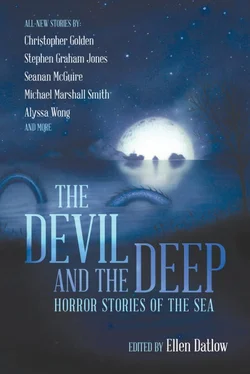Below them someone did scream, loud and long. The ropes under Swift’s hands pulled taut. For a dreadful moment he thought the entire rigging might go, ripped free by this man fighting for his life, but then ropes sagged back in place. Behind him, the man’s scream faded into a strange and awful distance.
“That is no ship,” Mrs. Newman said in a small voice.
Swift chewed his piece of lead to powder, and swallowed it down.
“Did you smell it?” Decurrs asked.
Swift was caught off guard. “The haunt?” The old salts said that ghosts had a smell, a stench by which a lore-steeped sailor would know them. “I did not catch it.”
“I did,” Decurrs said. “It smelled like sick and pus swept together on a hot deck. It smelled like a hold full of shit and fear. I know that smell. So do you.”
Swift felt ill. “I smelled nothing,” he said.
“I think I saw her netting, when she came about,” Decurrs said.
Swift pressed his forehead against the ratline. He could feel the rough fibers of the rope cutting into his skin.
“You think she’s a slaver?” The words surprised him; Swift had not thought to speak, not out loud.
“Aren’t most ghost ships slavers? They are in the tales.” Decurrs leaned forward to eye the snoring Gunner, then lowered his voice.
“I knew you’d been in the Trade by the Guinea scars on your legs,” he said. “Aye, and by the scars on your back. You sailed under a hard man?”
“They’re all hard men,” Swift said.
“Aye, but some are harder than the Devil himself.” Decurrs leaned into his shroud, his face in shadow. “Were you articled? I was. Woke up on the tavern floor with a crimp holding a paper in front of me. He said I’d signed, so what could I do?”
There was a sour taste at the back of Swift’s throat. “I was in debtors’ prison,” he said. “I took the Guinea door.”
“A hard choice,” Decurrs said.
“Not for me,” Swift said. “Not then.” He remembered how Bessie’s hands had twisted as the captain described the offer—Swift’s debt paid, if only he’d agree to sail aboard a slaver. And he remembered watching Emily clutching the bent twig she called a doll, thinking how tired he was of watching his child play in a prison cell.
Swift was no fool. He’d expected to die on that voyage, as most slave-ship sailors did—from disease or from the captain’s beatings. But with his debt paid, his family would be free. He had not known then, how his debt would accumulate onboard; that it would be not one voyage, but two, then three, that he would owe. Bessie and Emily were long dead now, but Swift’s debt was still alive, out there somewhere, looking for him.
“ Beware, beware, the Bight of Benin ,” Decurrs said. “ There's one comes out for forty goes in. Well, we’re the ones who came out. Now here we are. And here’s the haunt-ship come to collect.”
The Gunner laughed. The sound jolted them both; they had not realized the man was awake. “You think the haunt comes for you? How fine you are, in all your sins. Me, I have drawn lots to eat men. I have cracked a boy’s leg open and sucked the marrow from it. I have heard this talk before, of curses and Providence, aye, and eaten the flesh of those who talked so.”
Decurrs shifted away from the man. He climbed downwards, not caring that he had to contort himself around the other bodies on the rigging. Swift followed, but he could still hear the Gunner talking after them.
“Here’s your truth,” the Gunner called. “The haunt comes like the wind comes. You fools think it comes for your sins because you want to believe there’s justice in the world. There isn’t any.”
“He is mad,” Decurrs said when they reached the lower rigging. “We will all go mad here.”
They hung on the ropes and watched the deck below. The sea was calmer now. A few sailors had left the rigging and were trying the quarterdeck, staggering about on the wet boards.
We should get the passengers below, to stretch their legs while they can , Swift thought. We should build a raft.
“Glosse was right,” Decurrs said after a time. “We must have a reckoning.”
The sailors had come, finally, to speaking of the Trade.
“The Nancy ’s captain stood the other Negroes on deck so they could watch. He had lines tied under the arms of the ringleaders. He ordered them lowered over the side,” said Cobb.
“Go on,” said Glosse.
The remnants of the starboard watch had gathered on the abandoned crow’s nest for their consultation. Far below, passengers and sailors tested out the limits of the quarterdeck. As third mate, Glosse stood as judge on the Minerva . As far as they knew, he was the only officer left on the wreck, save the Gunner, whose strange calm they all suspected.
Cobb looked away, as though scanning the horizon. Swift knew his gaze had gone somewhere else.
“When the water turned red, he gave the order to hoist them up. The sharks had taken No. 3’s legs off at the knees. I thought she was already dead. But when we lowered her again, she started screaming. So I suppose she had only fainted.”
“How long did it take?” Glosse was precise. It was important to focus on the facts, in such matters.
“I think an hour before all three were dead. The captain cut the ropes on the last one; it took too long.”
Glosse nodded, satisfied.
“Did you not protest the order?” the boy exclaimed. How he had maintained his capacity for horror, Swift did not know.
Cobb shrugged, his sunken eyes flat and hard, like sea-washed stones.
“Who else?” said Glosse, ignoring the boy’s question. “Not the usual things . We all know them.” He paused. Swift wondered if the boy could hear everything that lurked in those words, but he stared bewildered; Pretty Pol’s face was closed. This was a current that flowed past them, the sailors who had not worked the Trade.
“And what have you done, Glosse?” Decurrs’s voice sliced knife-sharp. Glosse scratched his chin. Like the rest of them, his blistered skin had begun to tear, hanging off in dead strips.
“I’ve lashed and pickled,” Glosse said. “Aye, I’ve done the usual things . But not to the children. Not like some.” Decurrs blinked and looked away.
“Did you not pass the whisper?” The boy was still incensed at Cobb’s story. “Mr. Clarkson and his ’bolitionists are forever combing the docks, asking tars to testify. You could have passed the whisper at least.”
“Aye,” Cobb said sourly. “And didn’t some Bristol boys club Mr. Clarkson and try to feed him to the sea? When the owners pay good coin to kill Cambridge gentlemen, what do you think the chances are for a common tar like me?”
“That Negro seaman, Equiano, him what wrote the narrative,” the boy said stubbornly. “He passes whispers for tars. He passed the whisper on the Zong , even—”
Swift’s blood drummed in his ears.
“—and they haven’t killed him yet.”
“I had a shipmate who passed the whisper once,” Decurrs said. His voice had gone low and strange. “Listen,” he said, fixing them with his gaze. “There was a ship. She sailed under a hard man. A Negro caused trouble in the hold. No. 37. So this Captain Bremmer—” Decurrs’s face contorted for a moment, as though he would like to spit, but thought better of it. “This Bremmer, he ordered the man whipped and pickled with salt water. You know,” he said to Glosse, “the usual things . But this captain, he went further.
Читать дальше













